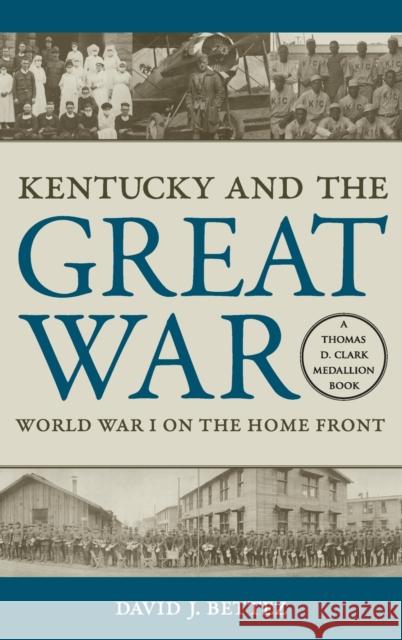Kentucky and the Great War: World War I on the Home Front » książka
Kentucky and the Great War: World War I on the Home Front
ISBN-13: 9780813168012 / Angielski / Twarda / 2016 / 440 str.
Kentucky and the Great War: World War I on the Home Front
ISBN-13: 9780813168012 / Angielski / Twarda / 2016 / 440 str.
(netto: 186,58 VAT: 5%)
Najniższa cena z 30 dni: 194,31
ok. 22 dni roboczych.
Darmowa dostawa!
From five thousand children marching in a parade, singing, "Johnnie get your hoe.... Mary dig your row," to communities banding together to observe Meatless Tuesdays and Wheatless Wednesdays, Kentuckians were loyal supporters of their country during the First World War. Kentucky had one of the lowest rates of draft dodging in the nation, and the state increased its coal production by 50 percent during the war years. Overwhelmingly, the people of the Commonwealth set aside partisan interests and worked together to help the nation achieve victory in Europe.David J. Bettez provides the first comprehensive analysis of the impact of the Great War on Bluegrass society, politics, economy, and culture, contextualizing the state's involvement within the national experience. His exhaustively researched study examines the Kentucky Council of Defense -- which sponsored local war-effort activities -- military mobilization and preparation, opposition and dissent, and the role of religion and higher education in shaping the state's response to the war. It also describes the efforts of Kentuckians who served abroad in military and civilian capacities, and postwar memorialization of their contributions. Kentucky and the Great War explores the impact of the conflict on women's suffrage, child labor, and African American life. In particular, Bettez investigates how black citizens were urged to support a war to make the world "safe for democracy" even as their civil rights and freedoms were violated in the Jim Crow South. This engaging and timely social history offers new perspectives on an overlooked aspect of World War I.
From five thousand children marching in a parade, singing, “Johnnie get your hoe. . . . Mary dig your row,” to communities banding together to observe Meatless Tuesdays and Wheatless Wednesdays, Kentuckians were loyal supporters of their country during the First World War. Kentucky had one of the lowest rates of draft dodging in the nation, and the state increased its coal production by 50 percent during the war years. Overwhelmingly, the people of the Commonwealth set aside partisan interests and worked together to help the nation achieve victory in Europe.David J. Bettez provides the first comprehensive analysis of the impact of the Great War on Bluegrass society, politics, economy, and culture, contextualizing the state’s involvement within the national experience. His exhaustively researched study examines the Kentucky Council of Defense—which sponsored local war-effort activities—military mobilization and preparation, opposition and dissent, and the role of religion and higher education in shaping the state’s response to the war. It also describes the efforts of Kentuckians who served abroad in military and civilian capacities, and postwar memorialization of their contributions.Kentucky and the Great War explores the impact of the conflict on women’s suffrage, child labor, and African American life. In particular, Bettez investigates how black citizens were urged to support a war to make the world “safe for democracy” even as their civil rights and freedoms were violated in the Jim Crow South. This engaging and timely social history offers new perspectives on an overlooked aspect of World War I.











